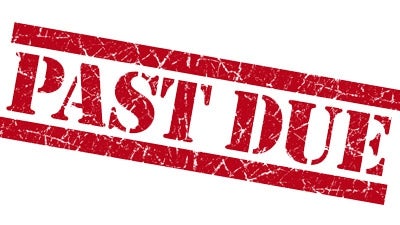
A few weeks ago, I received an email from a frantic new business owner. One of his clients—a very large company—had an outstanding invoice that was 90 days past due. Concerned and cash-strapped, he wanted to know what he should do.
“Calm down,” was the first advice I gave him. During tough economic times, customers and clients of all sizes often have slower pay cycles. However, that being said, while you don’t need to panic right away, it’s also something you shouldn’t ignore either.
Early in my entrepreneurial career, I allowed a major client to get months behind on invoices while I made the mistake of continuing to do more work for them. I didn’t want to complain because I was worried it would hurt the relationship. Eventually, the company went bankrupt, and I was one of many creditors standing in line hoping to get a crumb or two. Trust me, I’ve never made that mistake again.
Aging account receivables cause critical cash flow issues and can put your business at risk. To protect your business you need to establish good credit practices. After all, the survival of your business depends on getting paid.
Before you agree to extend credit to a customer, establish the credit terms. Determine when the payment will be due and what, if any, late fees or penalties will be assessed. Consider offering a discount for early payment or require a certain percentage of the total amount to be paid in advance.
Make sure you document every aspect of the transaction. And this may sound elementary, but don’t forget to get your customer’s signature on all pertinent paperwork such as sales agreements, contracts, and delivery receipts. Unfortunately, I’ve seen companies lose significant amounts of money because they trusted a customer and didn’t get a signature on an important document. Trust is good, but signed documents are better.
Once you’ve invoiced your customer, don’t stop there. Send a payment reminder prior to the due date. Along with the payment reminder, you can ask for feedback regarding your product or service. This gives you a chance to correct an issue before it becomes an excuse for non-payment.
Don’t be afraid to pick up the phone. Communication with a slow-paying customer is smart. Unfortunately, as I was early on in my career, many business owners are uncomfortable making those calls. We are dealing with difficult economic times and sometimes by talking through the situation with your customer you can work together to create a payment plan. Something is better than nothing.
Finally, if you aren’t successful in collecting outstanding invoices, you may have to resort to more drastic measures. A collection agency or a law firm specializing in collections are options, but make sure the firm has a good reputation. Remember, they will be representing your business and if they use unprofessional tactics it can tarnish your reputation. Check with a professional adviser such as your lawyer or CPA or the Better Business Bureau before selecting a firm.
This article was originally published by Susan Solovic
Published: February 19, 2014
2882 Views
2882 Views












